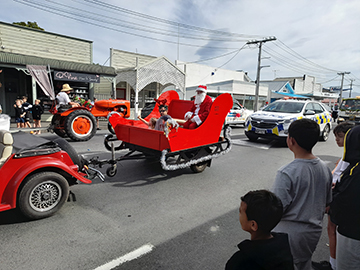(Reprint from The Guardian)
Record heat, record emissions, record fossil fuel consumption. One month after Cop28, the world is further than ever from reaching its collective climate goals. At the root of all these problems, according to recent research, is the human “behavioural crisis,” a term coined by an interdisciplinary team of scientists.
“We’ve socially engineered ourselves the way we geoengineered the planet,” says Joseph Merz, lead author of a new paper which proposes that climate breakdown is a symptom of ecological overshoot, which in turn is caused by the deliberate exploitation of human behaviour.
“We need to become mindful of the way we’re being manipulated,” says Merz, who is co-founder of the Merz Institute, an organisation that researches the systemic causes of the climate crisis and how to tackle them.
Merz and colleagues believe that most climate “solutions” proposed so far only tackle symptoms rather than the root cause of the crisis. This, they say, leads to increasing levels of the three “levers” of overshoot: consumption, waste and population.
They claim that unless demand for resources is reduced, many other innovations are just a sticking plaster. “We can deal with climate change and worsen overshoot,” says Merz. “The material footprint of renewable energy is dangerously underdiscussed. These energy farms have to be rebuilt every few decades – they’re not going to solve the bigger problem unless we tackle demand.”
“Overshoot” refers to how many Earths human society is using up to sustain – or grow – itself. Humanity would currently need 1.7 Earths to maintain consumption of resources at a level the planet’s biocapacity can regenerate.
Where discussion of climate often centres on carbon emissions, a focus on overshoot highlights the materials usage, waste output and growth of human society, all of which affect the Earth’s biosphere. … Continue Reading
More than 101,000 electric cars _ EVs _ drive New Zealand roads, with more and more coming down the pipe _ or over the hill as EV-driving visitors add to the growing numbers of local electric carss.
Local business is already finding limitations, with no public charging units in Martinborough, the closest in Featherston, with up to two designated for installation – but not in place – in Greytown.
Carterton’s car park has four.
The problems faced locally boil down primarily to power infrastructure.
The power load drawn by a single Tesla, Leaf, Ioniq, BYD, MG or Peugeot which is on trickle charging may be fine – but the present power system can “flip its fuse” if two of the above try charging at the same time.
Let alone the prospect of installing a fast charger for public use on a basic infrastructure system currently unable to supply the electric juice. The State Highway 2 infrastructure “corridor” has those necessary facilities.
At the Top 10 Holiday Park in Martinborough, trickle-down is the only option, with the electric infrastructure unable to supply at the power demand levels needed for even two Teslas to charge simultaneously.
It just took a couple of Teslas charging on the same power supply to blow the camp’s fuses last year, said camp ground owner Lisa Cornelissen.
Now the campground has “rules and conditions in place” that people need to abide by if the fusebox is to remain functional, she told The Star. … Continue Reading

Martinborough’s Christmas Parade attracted many hundreds of people, with some picnics on the grass in The Square, as well as thousands of flying toffees along the route of the floats _ which included trucks, tractors, mobility-driving seniors, marching Martinborough pipers and the essential Big Red Suit Guy.
Martinborough Community Board member Angela Brown said the last-minute rush of registration of floats was “fantastic. It was a microcosm of everything that’s Martinborough.”
“It was free … a range of people took part, from playcentre kids to seniors on their mobility scooters.”
The parade helped spark Christmas buzz through the community.
By Angela Brown
A belated and sincere “thank you” to everyone involved with the 2023 Martinborough Community Santa Parade – there was lots of work behind the scenes to make this happen. The support of the community was overwhelming.
Mary Smith and Kay Mills kicked the planning off early last year and their experience was invaluable in ensuring the parade embraced elements of the past.
The Mens Shed constructed a sleigh for Santa, the talented MADCAPS entertained with carols, the Toy Library set up a grotto and photo opportunity supported by the Martinborough Community Market. Rotary offered financial support and, together with Lions, acted as marshalls on the day. Members of the Community Board and all your local councillors were there offering support with traffic management or entertaining the crowds.
Biggest thank you goes to our amazing Santa who has taken time away from his Christmas delivery preparations for the past 30 years! We hope he enjoyed riding in his new sleigh.
If anyone would like to get involved with organising the 2024 parade, please get in touch. … Continue Reading
Recent Comments